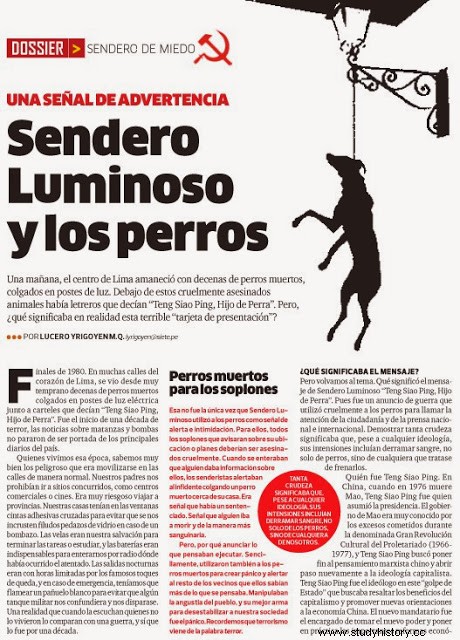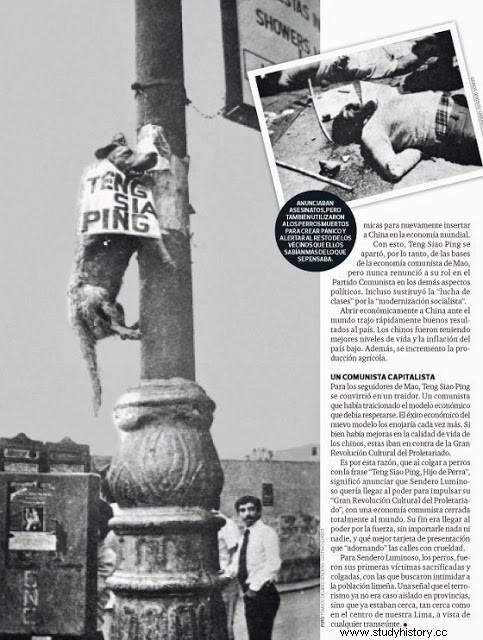One morning the center of Lima woke up with dozens of dead dogs hanging on poles. Beneath these cruelly slaughtered animals were signs reading “Teng Siao Ping, Son of a Bitch.” But, what did this terrible "business card" mean? End of 1980. The streets of downtown Lima woke up with dozens of dead dogs hanging on poles with signs that read "Teng Siao Ping, Son of a Bitch." It was the beginning of a decade of terror, the news about massacres and bombs did not stop being on the front page of the main newspapers in the country. Those of us who lived through that time know very well the dangers of moving normally on the streets as we normally do today. Our parents forbade us to go to crowded places like malls or movie theaters. We couldn't travel to the provinces as young students now do. Our houses had crossed sticky tape on the windows to prevent sharp pieces of glass from getting embedded in us in the event of a bombing. The candles were our salvation to finish the tasks or study and the batteries were essential to listen on Radio Programs where the attack had been. The night outings were with limited hours due to the famous curfews and in case of emergency we had to wave a white handkerchief to prevent a military tank from confusing us and shooting at us. A reality that when listened to by those who did not experience it, they compare it to a war, and it was for a decade.
What did the message mean? But let's get back on topic. What did Sendero Luminoso's message "Teng Siao Ping, Son of a Bitch" mean? Well, it was a war advertisement that cruelly used dogs to draw the attention of citizens and the national and international press. Demonstrating such crudeness meant that, despite any ideology, their intentions included spilling blood, not only from dogs, but from anyone who tried to stop them. Who was Teng Siao Ping. In China, when Mao died in 1976, Teng Siao Ping was the one who assumed the presidency. Mao's government was considered for excesses of the "Great Cultural Revolution of the Proletariat" (1966-1977) and Teng Siao Ping sought to put an end to Chinese Marxist thought and make way again for capitalist ideology. Teng Siao Ping was the ideologue in this coup that sought to highlight the benefits of capitalism and promoter of new directions for the Chinese economy. The new president was in charge of taking the new power and putting into practice the important economic reforms to once again insert China into the world economy. With this, Teng Siao Ping thus distanced himself from the foundations of Mao's communist economy, but he never renounced his role in the Communist Party in other political aspects. He even replaced “class struggle” with “socialist modernization.” Opening up China economically to the world quickly brought good results to the country. The Chinese were having better living standards and low country inflation. In addition, agricultural production increased.
A communist-capitalist To Mao's followers, Teng Siao Ping became a traitor. A communist who had betrayed the economic model that should be respected. The economic success of the new model would make them increasingly angry. Although there were improvements in the quality of life of the Chinese, these went against the "Great Cultural Revolution of the Proletariat." It is for this reason, that by hanging dogs with the phrase "Teng Siao Ping, Son of a Bitch", with dead dogs hanging on poles, meant announcing that Sendero Luminoso wanted to come to power to promote its "Great Cultural Revolution of the Proletariat", with a communist economy totally closed to the world. Their goal was to come to power by force, without caring about anything or anyone, and what better business card than "adorning" the streets with cruelty. For Sendero Luminoso, dogs were their first sacrificed and hanged victims, with which they sought to intimidate to the population of Lima. A sign that terrorism was no longer an isolated case in the provinces, but that they were already close, as close as in the center of our Lima, in view of any passerby.
Dead dogs for snitches That was not the only time that Shining Path used dogs as a sign of warning and intimidation. For them, all the snitches who reported their location or plans should be cruelly killed. When they found out that someone was giving information about them, the senderistas alerted the infidente by hanging a dead dog near his house. It was a sign that there was a sentenced. Signal that someone was going to die and in the bloodiest way. But why announce what they intended to execute? Quite simply, they also used the dead dogs to create panic and alert the rest of the neighbors that they knew more than they thought. They manipulated the anguish of the people and their best weapon to destabilize our society was panic. Let us remember that terrorism comes from the word terror.
Published in Semanario Siete on September 9, 2012
 Hanging dogs in Lima:A warning sign from Sendero Luminoso
Hanging dogs in Lima:A warning sign from Sendero Luminoso  Terrorism arrives in Lima:Dozens of dogs hanged on Lima's electricity poles
Terrorism arrives in Lima:Dozens of dogs hanged on Lima's electricity poles 